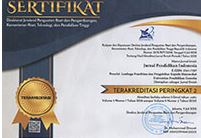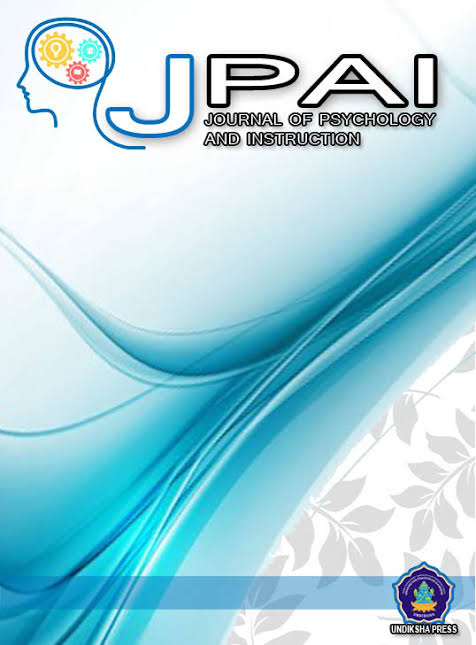Emotional Intelligence and Work Engagement in Working Mother
DOI:
https://doi.org/10.23887/jpai.v6i3.45759Keywords:
Emotional, Intelligence, Work Engagement, Career WomenAbstract
Career women often face obstacles due to their roles as workers and as housewives. This is caused by the negative cognitions and emotions experienced by married women which can lead to a decrease in the level of work engagement. Meanwhile, to be fully involved in individual work requires self-utilization, both cognitively and emotionally. This study aims to analyze the relationship between emotional intelligence and work engagement in married career women. Subjects in this study amounted to 70 people who have the characteristics of a career woman who is married, with a minimum of one year of work. Subjects were taken using purposive sampling method. Collecting data in this study using the Emotional Intelligence Scale and Work Engagement Scale. The data analysis technique used is the product moment correlation of Karl Pearson. Based on the results of data analysis obtained a correlation coefficient (R) of 0.479 with p = 0.000 (p <, 0.05). These results indicate that there is a positive relationship between emotional intelligence and work engagement. To maintain and improve emotional intelligence can be done with meditation, doing fun activities, and reflection to practice the ability to understand yourself and others.
References
Afroz, N. N. (2018). Effects of Training on Employee Performance : A Study on Banking Sector, Tangail Bangladesh. Global Journal of Economic and Business, 4(1), 111–124. https://doi.org/10.12816/0048158. DOI: https://doi.org/10.12816/0048158
Anoraga, P. (2014). Psikologi kerja. PT. Rineka Cipta.
Ardiansyah, Y., & Sulistiyowati, L. H. (2018). Pengaruh kompetensi dan kecerdasan emosional terhadap kinerja pegawai. Jurnal Inspirasi Bisnis Dan Manajemen, 2(1), 91–100. https://doi.org/https://doi.org/10.33603/jibm.v2i1.1064. DOI: https://doi.org/10.33603/jibm.v2i1.1064
Ayu, D. R., Maarif, S., & Sukmawati, A. (2015). Pengaruh job demands job resources dan personal resources terhadap work engagement. Jurnal Aplikasi Bisnis Dan Manajemen, 1(1), 12–22. https://doi.org/https://doi.org/10.17358/jabm.1.1.12. DOI: https://doi.org/10.17358/JABM.1.1.12
Bakker, A. B. (2011). An evidence-based model of work engagement. Current Directions in Psychological Science, 20(4), 265–269. https://doi.org/10.1177/0963721411414534. DOI: https://doi.org/10.1177/0963721411414534
Bakker, A. B., Albrecht, S. L., & Leiter, M. P. (2011). Work engagement: Further reflections on the state of play. European Journal of Work and Organizational Psychology, 200(1), 74–88. https://doi.org/10.1080/1359432X.2010.546711. DOI: https://doi.org/10.1080/1359432X.2010.546711
Bakker, Arnold B., Hetland, J., Kjellevold Olsen, O., & Espevik, R. (2022). Daily transformational leadership: A source of inspiration for follower performance? European Management Journal, 40(4), 1–9. https://doi.org/10.1016/j.emj.2022.04.004. DOI: https://doi.org/10.1016/j.emj.2022.04.004
Cahyana, K. S., & Prahara, S. A. (2021). Work engagement dengan intensi turnover pada karyawan. Intuisi: Jurnal Psikologi Ilmiah, 12(3), 285–294. https://journal.unnes.ac.id/nju/index.php/INTUISI/article/view/24073. DOI: https://doi.org/10.15294/intuisi.v12i3.24073
Carmelia, T., Tiatri, S., & Wijaya, E. (2017). Akademik dengan job performance pada mahasiswa aktif organisasi kemahasiswaan. Humaniora, 1(2), 187–197. https://doi.org/10.24912/jmishumsen.v1i2.918. DOI: https://doi.org/10.24912/jmishumsen.v1i2.918
Çetin, F., & Aşkun, D. (2018). The effect of occupational self-efficacy on work performance through intrinsic work motivation. Management Research Review, 41(2), 186–201. https://doi.org/10.1108/MRR-03-2017-0062. DOI: https://doi.org/10.1108/MRR-03-2017-0062
Crawley, D. C., Maher, J. K., & Blake-Beard, S. (2015). She’s already busy: An exploratory study of women’s workplace attitudes as predictors of organizational citizenship behavior. Gender in Management, 30(4), 286–311. https://doi.org/10.1108/GM-04-2014-0033. DOI: https://doi.org/10.1108/GM-04-2014-0033
Ernawati, & Ambarini. (2010). Pengaruh hubungan kerja dan lingkungan kerja terhadap kinerja pegawai dengan motivasi kerja sebagai variabel moderating. Ekonomi Dan Kewirausahaan, 10(2), 109–118. https://www.neliti.com/publications/23407.
Goleman, D. (2009). Kecerdasan emosional : Mengapa EI lebih penting daripada IQ. PT. Sun.
Gupta, G. K., Rani, S., & Kumar, R. (2016). Analysis of management of supracondylar femur fracture by locking compression plate. International Journal of Orthopaedics Sciences, 2(4), 218–222. http://www.orthopaper.com/archives/2016/vol2issue4/PartD/2-4-33-850.pdf. DOI: https://doi.org/10.22271/ortho.2016.v2.i4d.35
Handayani, A. (2013). Keseimbangan kerja keluarga pada perempuan bekerja: Tinjauan teori border. Buletin Psikologi Universitas Gadjah Mada. Fakultas Psikologi, 21(2), 90–101. https://doi.org/https://doi.org/10.22146/bpsi.7373.
Iskandar, D., Ambarita, A., & Sowiyah, S. (2014). Pengaruh kecerdasan emosional dan motivasi berprestasi terhadap kinerja guru. Jurnal Manajemen Mutu Pendidikan, 2(3). http://jurnal.fkip.unila.ac.id/index.php/JMMP/article/viewFile/6230/3864.
Kuntari, C. M. I. S. R. (2015). Hubungan work-family enrichment dengan work engagement pada perawat wanita. Psikologi Ulayat, 2(1), 407–417. https://doi.org/10.24854/jpu32. DOI: https://doi.org/10.24854/jpu32
Kusumah, A. I., Haryadi, A. I., Indrayanto, A., & Setiawan, I. (2021). A mediating and moderating role on employee performance appraisal. Management Research Review, 44(12), 1639–1659. https://doi.org/10.1108/MRR-11-2020-0701. DOI: https://doi.org/10.1108/MRR-11-2020-0701
Lai, C.-S., Au, K.-M., & Low, C.-S. (2021). Beyond Conventional Classroom Learning: Linking Emotions and Self-Efficacy to Academic Achievement and Satisfaction with Online Learning during the COVID-19 Pandemic. Journal of Education and E-Learning Research, 8(4). https://doi.org/10.20448/journal.509.2021.84.367.374. DOI: https://doi.org/10.20448/journal.509.2021.84.367.374
Makboul, L. (2017). Beyond Preaching Women: Saudi Dāiyāt and Their Engagement in the Public Sphere. Welt Des Islams, 57(3–4), 303–328. https://doi.org/10.1163/15700607-05734P03. DOI: https://doi.org/10.1163/15700607-05734p03
Man, G. S., & Hadi, C. (2013). Hubungan antara perceived organizational support dengan work engagement pada guru SMA swasta di Surabaya. Jurnal Psikologi Industri Dan Organisasi, 2(2), 90–99. https://doi.org/https://doi.org/10.1002/(SICI)1097-0029.
Manizar, E. (2016). Mengelola kecerdasan emosi. Tadrib: Jurnal Pendidikan Agama Islam, 2(2), 198–213. http://jurnal.radenfatah.ac.id/index.php/Tadrib/article/view/1168.
Mewengkang, M., & Panggabean, H. (2016). Work engagement karyawan MSN terhadap implementasi data analisis SDM. Jurnal Ilmiah Psikologi MANASA, 5(1), 1–14. http://ejournal.atmajaya.ac.id/index.php/Manasa/article/view/182.
Nugroho, D. A. S., Mujiasih, E., & Prihatsanti, U. (2013). Hubungan antara psychological capital dengan work engagement pada karyawan PT Bank Mega regional area Semarang. Psikologi Psikologi Universitas Diponegoro, 12(2). https://doi.org/10.14710/jpu.12.2.192-202.
Pogere, E. F., López-Sangil, M. C., García-Señorán, M. M., & González, A. (2019). Teachers’ job stressors and coping strategies: Their structural relationships with emotional exhaustion and autonomy support. Teaching and Teacher Education, 85, 269–280. https://doi.org/10.1016/j.tate.2019.07.001. DOI: https://doi.org/10.1016/j.tate.2019.07.001
Prahara, S. A., & Halias, D. S. (2019). Kepuasan kerja dengan employee engagement pada driver ojek online. Psyche 165 Journal, 5(2), 108–116. https://doi.org/10.35134/jpsy165.v13i1.62. DOI: https://doi.org/10.35134/jpsy165.v13i1.62
Puspasari, A. (2009). Emotional intelligent parenting. PT. Elex Media Lomputindo.
Putri, I. G. A. M. A. D., & Wirawati, N. G. P. (2020). Influence of Intellectual/Emotional/Spiritual Intelligence, Independence, and Tri Hita Karana on Auditor Performance. Jurnal Ilmiah Akuntansi Dan Bisnis, 15(1), 85. https://doi.org/10.24843/jiab.2020.v15.i01.p08. DOI: https://doi.org/10.24843/JIAB.2020.v15.i01.p08
Rohmah, N. (2018). Integrasi kecerdasan intelektual (IQ), kecerdasan emosi (EQ) dan kecerdasan spiritual (SQ) dalam meningkatkan etos kerja. Tarbiyatuna: Jurnal Pendidikan Ilmiah, 3(2), 77–102. http://ejournal.kopertais4.or.id/mataraman/index.php/tarbiyatuna/article/view/3525.
Salanova, M., & Schaufeli, W. B. (2008). Job resources, engagement and proactive behaviour. International Journal of Human Resource Management, 19, 116–131. https://doi.org/10.1080/09585190701763982. DOI: https://doi.org/10.1080/09585190701763982
Santoso, J. E. (2012). Good ethos : 7 etos kerja terbaik dan mulia. PT. Alek Media Komputindo. DOI: https://doi.org/10.7476/9788523211523
Sari, T., & Yulita, H. (2018). Keterikatan karyawan dipengaruhi oleh kecerdasan emosional dan modal psikologis(studi empiris : PT. Fajar Lestari Sejati, Jakarta). National Conference of Creative Industry, 5(6), 640–655. https://doi.org/https://doi.org/10.30813/ncci.v0i0.1270. DOI: https://doi.org/10.30813/ncci.v0i0.1270
Schaufeli, W. (2012). Work engagement what do we know and where do we go? Romanian Journal of Applied Psychology, 14(1), 3–10. https://lirias.kuleuven.be/retrieve/307310.
Skaalvik, E. M., & Skaalvik, S. (2010). Teacher Self-Efficacy And Teacher Burnout: A Study Of Relations. Teaching and Teacher Education, 26(4), 1059–1069. https://doi.org/10.1016/j.tate.2009.11.001. DOI: https://doi.org/10.1016/j.tate.2009.11.001
Suharianto, & Effendy, N. (2015). Pengaruh psychological capital terhadap work engagement pada dosen di Universitas Katoloik Widya mMandala Surabaya. Jurnal Experientia, 3(2), 23–34. https://doi.org/10.33508/exp.v3i2.905.
Sulistyanto, S., Mutohhari, F., Kurniawan, A., & Ratnawati, D. (2021). Kebutuhan Kompetensi Dalam Pasar Tenaga Kerja Di Era Revolusi Industri 4.0 Bagi Siswa SMK. Jurnal Taman Vokasi, 9(1), 25–35. https://doi.org/10.30738/jtv.v9i1.7742.
Sumiyarsih, W., Mujiasih, E., & Ariati, J. (2012). Hubungan antara kecerdasan emosional dengan organizational citizenship behavior (ocb) pada karyawan CV. Aneka Ilmu Semarang. Jurnal Psikologi Universitas Diponegoro, 11(19–27). http://digilib.mercubuana.ac.id/manager/t!@file_artikel_abstrak/Isi_Artikel_990753452852.pdf.
Susilo, D. F. Z., & Prahara, S. A. (2019). Work-family enrichment dan work engagement pada karyawan yang sudah menikah. Jurnal Mediapsi, 5(2), 108–116. https://scholar.archive.org/work/quytdbc2hzbcthvuuh6yan3why/access. DOI: https://doi.org/10.21776/ub.mps.2019.005.02.5
Syed, J., Ali, F., & Winstanley, D. (2005). In pursuit of modesty: Contextual emotional labour and the dilemma for working women in Islamic societies. International Journal of Work, Organisation and Emotion, 1, 150–167. https://doi.org/10.1504/IJWOE.2005.008819. DOI: https://doi.org/10.1504/IJWOE.2005.008819
Wulandari, E., & Ratnaningsih, I. Z. (2017). Keterikatan kerja pada guru sekolah menengah atas negeri berakreditasi A di kecamatan Ngaliyan. Empati, 6(1), 133–138. https://doi.org/10.14710/empati.2017.15173. DOI: https://doi.org/10.14710/empati.2017.15173
Yang, J., & Treadway, D. C. (2018). A social influence interpretation of workplace ostracism and counterproductive work behavior. Journal of Business Ethics, 148(4), 879–891. https://doi.org/10.1007/s10551-015-2912-x. DOI: https://doi.org/10.1007/s10551-015-2912-x
Yuan, Z., Li, Y., & Tetrick, L. (2015). Job hindrances, job resources, and safety performance: The mediating role of job engagement. Applied Ergonomics, 51, 163–171. https://doi.org/10.1016/j.apergo.2015.04.021. DOI: https://doi.org/10.1016/j.apergo.2015.04.021










